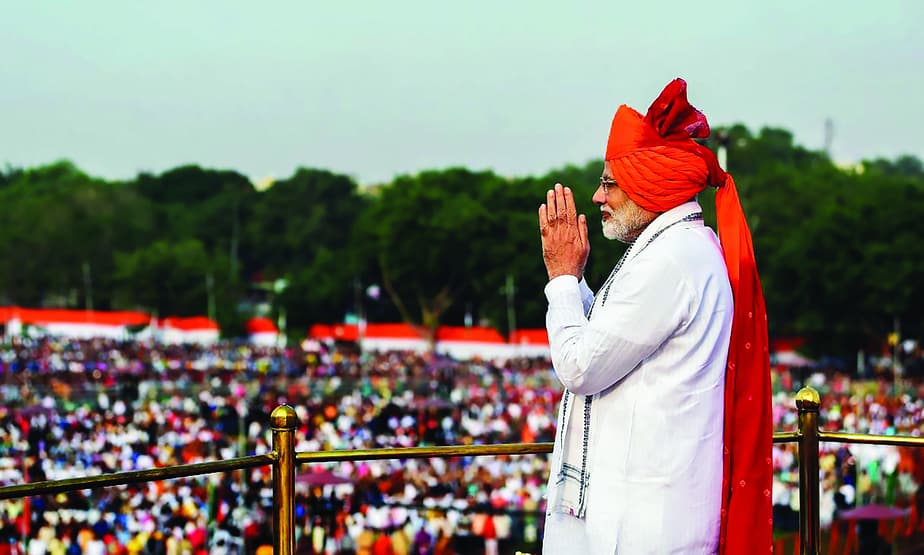If Modi goes down as one-term PM, his 2018 Red Fort speech would be judged against the speech he delivered in 2014
Among the few regular sights at the Independence Day celebrations at Red Fort is seeing a large number of people fanning themselves to cope with a sultry morning. Somehow it comes across as the victory of the immediate over the essential.
That’s also the fate of a Prime Minister speaking from the ramparts of the historical monument in the last year of his current tenure and seeking re-election next year. In his 90-minute speech, Narendra Modi tried to sum up his work in the office with claims of overall accomplishments and optimism. It’s a risky proposition for any Third World political head to sell without distancing the audience. The seasoned campaigner in Modi knew that was worth the risk — the audience is far broader than what is seen on television screens.
Generally speaking, tenure-ending Independence Day speeches of incumbent Prime Ministers have been legacy-accounts of their respective terms. That was the case with Modi too. However, the points of departure were also visible.
Unlike his last two predecessors, Atal Bihari Vajpayee and Dr Manmohan Singh, who made foreign policy an important part of their tenure-ending Red Fort speeches, international and bilateral issues were mostly absent from Modi’s speech. Besides vague references to India’s growing stature on the international stage, there was no talk of how the country is engaging or even dealing with the world powers and its neighbours.
The juxtaposition of pre-2014 and post-2014 governance and development scenario was a clear indication of using the report card as an electoral pitch – something that was seen in his response to a no-confidence motion in Lok Sabha last month too.
However, he made sure he didn’t repeat the mistake of reading too much from documents and rattling off statistics. His last I-Day speech, and for that matter his latest Lok Sabha intervention too, was marred by such uncharacteristic recourse to bureaucratic devices. Yet some numbers about the economy could be put to fact-checkers’ scrutiny — some for exaggeration, some for inadvertence and some for jugglery typical of bureaucratic apparatus.
Expectedly, Prime Minister dwelt on the achievements of his flagship programmes — Swachch Bharat, Ujjawala and Digital India, while making sure that rural India and farmers found mention in his emphasis on addressing their concerns about Minimum Support Price (MSP), crop insurance and facilitation of farm credit. He supplemented it with his focus on modernisation of agriculture and making it competitive in global markets.
This was dovetailed with claims of making India a friendlier destination for business investments and improving ease of doing business. The journey of converting red-tape to red-carpet, which Modi claims to have steered smoothly, is too bumpy a ride to convince any Indian so soon.
That, however, doesn’t take away from the fact that the general perception about his government’s drive against corruption has been mostly positive and he is keen on leveraging it. Prime Minister made the right noises about the middlemen derailing benefits of welfare programmes and how he was leading a crackdown against them.
While he talked about his government’s decisiveness, citing its determination in bringing GST regime, the fact that Modi skipped any mention of demonetisation suggests a tactical retreat given the uncertain nature of public response to the move.
The one current news cycle narrative which made its way to the Prime Minister’s speech was the ways to deal with sexual crimes against women. Calling such criminal mindset ‘devilish’, Modi sought answers in the newly legislated death penalty for child rapists and a change in social attitudes. It was one of the only few themes that he carried from his first speech at Red Fort.
Beyond applauding women achievers from different walks of life, Prime Minister wove the theme of women empowerment into legislation regarding triple talaq. Interestingly, one of the only two major policy announcements made concerned women. He announced that permanent commission would be awarded to women officers who make it to defence services through short service commission.
The only major scheme announced was Pradhan Mantri Jan Arogya Abhiyaan (Ayushman Bharat) that will be launched on September 25 on the birth anniversary of Pandit Deendayal Upadhyay. It was preceded by an announcement which could become significant in years to come — the launch of India’s manned space mission in 2022.
What could, however, be significant for political messaging and consolidation of social constituencies was the precedence with which Modi is talking about giving constitutional status to the National Commission for Backward Classes (NCBC). A chunk of support from which widely fragmented social group is crucial for his electoral prospects next year.
In retrospect, if Modi goes down as one-term PM, his 2018 Red Fort speech would be judged against the speech he delivered in 2014 — the intervening ones were more bureaucratic, less Modisque. Though filled with civic homilies, his 2014 address from Red Fort had a template for a new governance culture and priorities, under a leader who had won a popular mandate.
Breaking the mould of talking about impersonal state structures and policy direction, his 2014 address – which included sharing concerns regarding lack of sanitation, restoring pride in work, widespread indifference and corruption, etc – had sought a new contract with citizens as stakeholders in the republic. Even if cynically reduced to rhetorical flourish, it had attracted the attention of professional political commentators and ordinary citizenry alike. Has 2018 address served as a review of that initiative to strike a dialogue with citizens?
Perhaps not. More than anyone else, Modi knows that the immediate always trumps over the essential in political success. He started speaking at Red Fort today with that realisation. Those fanning themselves there would agree.
www.newslaundry.com





